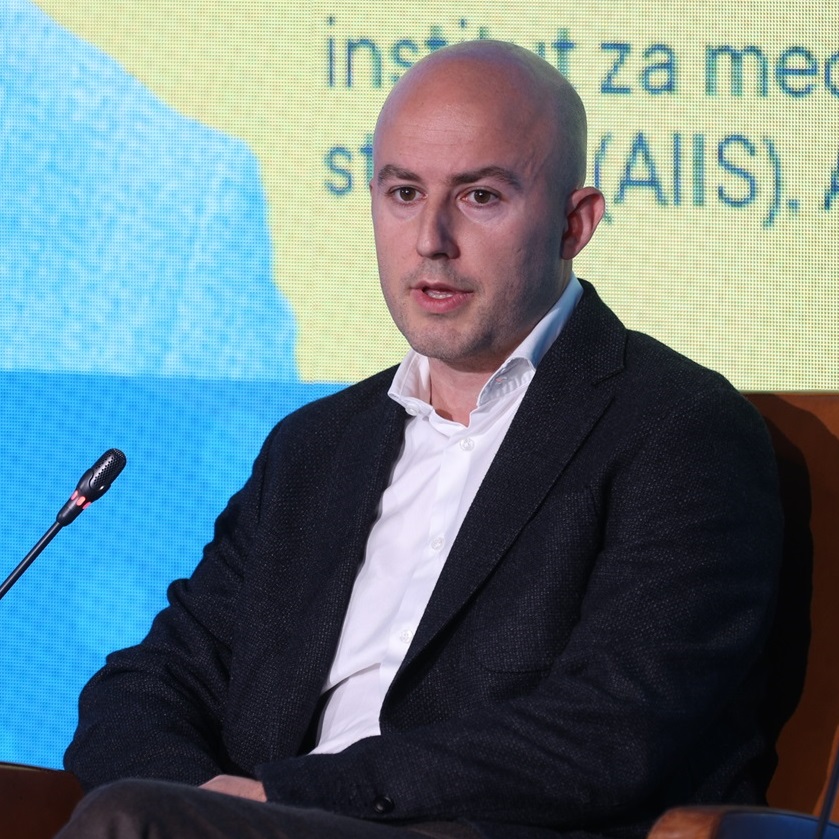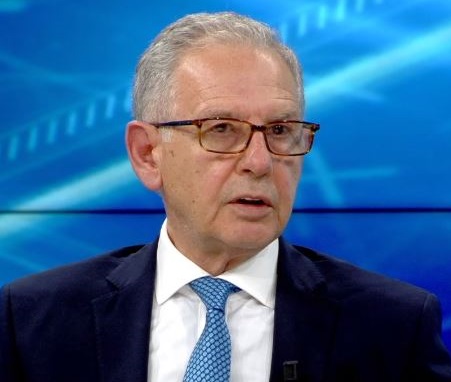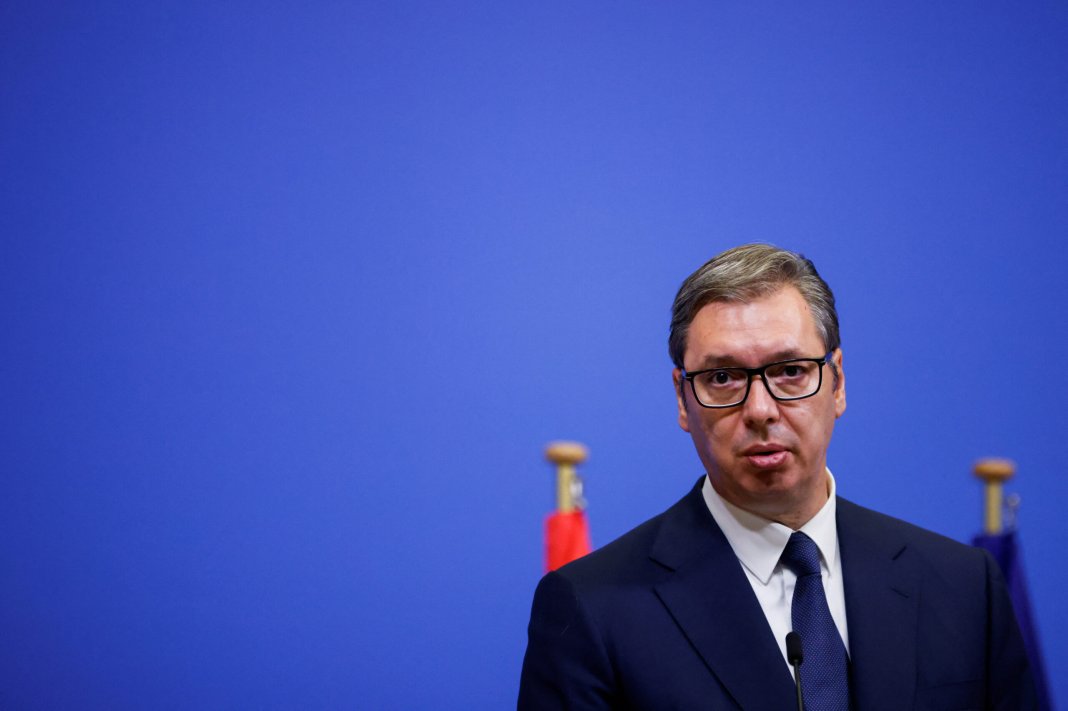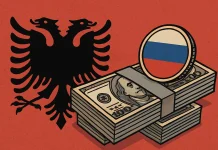Since the onset of the conflict in Ukraine, the narrative of a potential third world war has kept the public ‘on edge’ and ‘rewarded’ media outlets that capitalized on this sensitive topic to drive more clicks. The possibility of a world war has been echoed for the past three years by the same sources for political purposes. The latest instance came from Serbian President Aleksandar Vučić, who warned of a global conflict if the situation in Ukraine escalates further. Experts interpret this ‘revival’ of the narrative as Vučić’s maneuver to serve Serbian interests and apply pressure on Western powers.
Jona Plumbi
‘World on the Brink of Catastrophe / Vučić: Ukraine conflict Could Spark Global War’
This headline has been replicated by several media outlets in Albania, echoing verbatim the statement made by Serbian President Aleksandar Vučić on a Serbian television network.
The news was covered by Albanian media in both Albanian and English languages.
‘I believe we are transitioning from a special military operation to a major war, and the key question is where the red line will be drawn. We could find ourselves in a broad-scale global conflict, something unprecedented since World War II, within the next month or two,‘ Vučić is quoted as saying.
According to him, Serbia’s position is increasingly serious as major powers have weakened the United Nations, which he claims ‘pursue their own interests and have de facto undermined the UN-established order in recent decades.’
It’s worth noting that Vučić’s statements come shortly after the UN General Assembly adopted a resolution recognizing the genocide in Srebrenica and condemning its denial, a move that has unsettled Serbia, which opposed the resolution. However, the headline-grabbing aspect of the news was Vučić’s grim forecast of an imminent global conflict catastrophe stemming from the ongoing war in Ukraine, now entering its third year.




- https://www.oranews.tv/rajoni/bota-drejt-s-vucic-lufta-ne-ukraine-mund-te-nxise-nje-konflikt–i1162794
- https://newsbomb.al/rajon/treni-eshte-nisur-dhe-askush-nuk-do-ta-ndaloje-ate-vucic-lufta-ne-ukraine–i334556
- https://pamfleti.net/bota/vucic-nis-serish-polemikat-bota-po-shkon-drejt-s-lufta-ne-ukraine-i229101
- https://www.balkanëeb.com/bota-po-shkon-drejt-katastrofes-vucic-lufta-ne-ukraine-mund-te-nxise-nje-konflikt-global/#gsc.tab=0
- https://www.infoshqip.com/bota-po-shkon-drejt-katastrofes-vuciq-lufta-ne-ukraine-mund-te-nxise-nje-konflikt-global/
- https://alpenews.al/bota-po-shkon-drejt-katastrofes-vucic-lufta-ne-ukraine-mund-te-nxise-nje-konflikt-global/
- https://liberale.al/bota/globi/lufta-ne-ukraine-mund-te-nxise-nje-konflikt-global-paralajmerimi-i-vu-i100317
- https://kercova.net/2024/05/27/vuciq-lufta-ne-ukraine-mund-te-nxise-nje-konflikt-global/
- https://staging.botasot.info/evrope-bota/2177444/vuciq-lufta-ne-ukraine-mund-te-nxise-nje-konflikt-global/?ads_test=1716862460
The Narrative of a Global War Sparked by the Conflict in Ukraine Resurfaces Since Russia’s Unprovoked Attack Began. It has been ‘deployed’ by nearly all sides. Russia, Serbia, and Ukraine have revived this narrative as a potential scenario, each with distinct motives.





International relations scholar Ledion Krisafi underscores that Serbia’s revival of this thesis stems from its own interests and those of the nation.
‘A conflict between Russia and NATO would relieve Serbia from the obligation to negotiate with Kosovo; a potential Russian success in Ukraine might facilitate Republika Srpska’s secession and union with Serbia in Bosnia and Herzegovina. It would also allow Serbia to fully reopen the Kosovo issue if there is a direct confrontation between Russia and NATO, diverting NATO’s attention from Kosovo.“

On the other hand, for Russia, the narrative of a global war serves as a warning against Western interference.
‘For Russia, above all, this narrative serves as a warning to prevent direct Western intervention in Ukraine, demonstrating Russia’s readiness for a global war and its alliances capable of supporting such a conflict. This aims to dissuade the West from taking such a step.‘ Krisafi explains.
Agim Nesho views Vučić’s mention of a potential third world war as a means to pressure the West into accommodating his nationalist projects and restoring Serbian dominance in the Balkans.
‘He aligns this action with Russia as a partner for advancing joint initiatives, including Russian and Serbian spheres of influence in the Balkans. He advocates for a new geopolitical framework in the Western Balkans, envisioning Serbia’s renewed stance as part of a Greater Serbia along ethnic lines.’

Mr. Nesho, Albania’s representative to the United Nations from 1996 to 2005, also underscores that despite numerous conflict zones worldwide today, the likelihood of a new world war remains remote.










